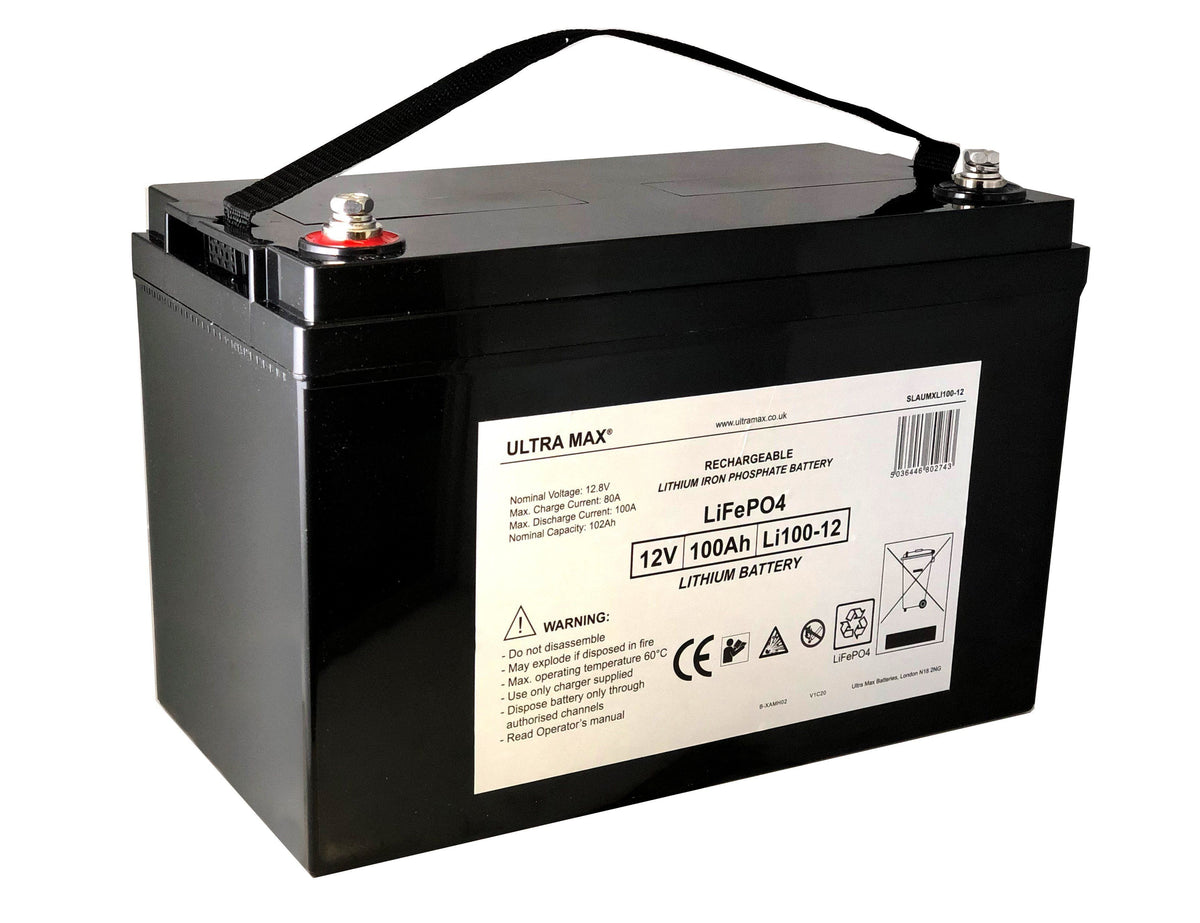
What is a Lithium LiFePO4 Battery?
|
|
Time to read 3 min
|
|
Time to read 3 min
Looking for a replacement battery for a golf trolley? Want to replace the heavy lead acid battery on a mobility scooter or wheelchair? A Lithium LiFePO4 battery might be exactly what you need! But what is a Lithium LiFePO4 battery? And what is the difference between a Lithium Iron Phosphate (LiFePO4) battery versus a Sealed Lead Acid (SLA) battery? Maplin are here to help you understand the numerous benefits of using a Lithium LiFePO4 battery.
A Lithium Iron Phosphate LiFePO4 battery (also known as LFP) is made up of multiple lithium cells and a battery management system (BMS). It looks and act very similar to lead acid batteries but provides a superior long-term performance with better stability.
As a type of lithium-ion battery chemistry, LiFePO4 batteries are known for having a lower energy density than conventional lithium-ion cells. This means they store less energy per unit weight or volume, but also makes them less volatile and generally safer to use. As a result, they're ideal for power tools, medical devices, emergency backup power systems and more.
A typical lead acid battery will run for roughly 300 – 400 cycles before it needs replacing. In comparison, an LFP battery has a long cycle life of up to 2000 cycles, making it a wise investment when it comes to keeping your electronics powered up.
They can be charged and discharged more times than conventional lithium-ion batteries before their performance begins to degrade. This makes them a great choice when longevity and reliability are key factors, such as solar power storage and backup power systems.
While the exact cycle life of LiFePO4 batteries can vary depending on factors such as temperature, charging protocols, and depth of discharge, they typically outperform other lithium-ion chemistries in terms of longevity.
Unlike lead acid batteries which use heavy lead plates, glass matt barriers and liquid or gel acid, LiFePO4 batteries take up far less space and weigh significantly less!
This makes them an ideal choice when you need power on the go. We even have a specialist range of Golf Trolley batteries which make use of these lightweight Lithium LiFePO4 batteries.
Lithium Iron Phosphate batteries do not emit noxious gases like lead acid batteries, so they can be used safely inside living compartments. There are no heavy or toxic materials, no raw chemicals that could spill out of it and they can often run at far higher temperatures, making them a safe and responsible choice.
Unlike some other lithium-ion chemistries, LiFePO4 batteries are inherently stable and resistant to thermal runaway, making them much safer to use. This inherent stability is due to the robust chemical structure of lithium iron phosphate, which is less prone to overheating and combustion, even under extreme conditions.
This enhanced safety profile makes LiFePO4 batteries an ideal choice for applications where safety is critical, such as electric vehicles, renewable energy storage systems, and portable electronic devices.
Lithium LiFePO4 batteries represent a significant advancement in battery technology, offering enhanced safety, long cycle life, high energy density, fast charging capability, and wide operating temperature range. With their superior performance and versatility, LiFePO4 batteries are poised to revolutionize a wide range of industries, from renewable energy storage to electric transportation. As innovation continues to drive progress in battery technology, LiFePO4 batteries stand out as a beacon of reliability, efficiency, and sustainability in the quest for cleaner, greener energy solutions.
Ready to learn more? Explore our Lithium Iron Phosphate LiFePO4 range and find the ideal model to keep your devices powered up! If you're looking for more power solutions, why not check out our range of Power Stations and Power Banks.
Composition: LiFePO4 batteries consist of lithium cells and a battery management system, resembling lead acid batteries but offering superior long-term performance and stability
Energy Density: While they have lower energy density compared to conventional lithium-ion cells, LiFePO4 batteries are less volatile and safer, making them suitable for power tools, medical devices, and emergency backup power systems
Long Service Life: LiFePO4 batteries have a longer cycle life of up to 2000 cycles compared to 300-400 cycles of lead acid batteries, making them ideal for applications requiring longevity and reliability such as solar power storage
Lightweight Design: LiFePO4 batteries are lightweight compared to lead acid batteries, making them suitable for portable applications like golf trolleys and on-the-go power needs
Safety: LiFePO4 batteries are safe for indoor use, emitting no noxious gases and featuring a stable chemical structure that resists overheating and combustion, making them ideal for electric vehicles, renewable energy storage, and portable electronics
An avid gamer from a young age, Jon has dabbled in gaming journalism and dedicates much of his spare time to this hobby. He also has an interest in music, playing bass guitar in a rock covers band.
Having previously worked as a copywriter with another electronics retailer, he was eager to join Maplin with their new online venture. In addition to writing blogs, Jon also works on many of the website's landing pages and adding new tech to the range.
